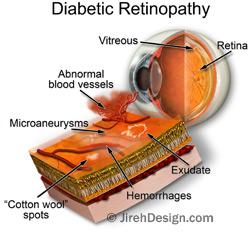Anti VEGF drugs are being used to treat diabetic retinopathy


Anti VEGF drugs are being used to treat diabetic retinopathy
Anti VEGF drugs can now benefit diabetic retinopathy patients. Studies are complete.
There have been several clinical studies evaluating the use of anti-VEGF drugs for treatment of diabetic retinopathy. The outcomes of these studies are very encouraging for those patients suffering from diabetic macular edema.
VEGF inhibitors, (Anti-VEGFs) are drugs that have been used for the treatment of wet macular degeneration (AMD) since 2005. Recently, ophthalmologists have had great success in treating diabetic retinopathy patients with the injectable drug.
Anti-VEGF drugs work by blocking or suppressing the formation of abnormal new blood vessel growth in the retina — the light-sensitive, multi-layered tissue that lines the back of the eyeball. These abnormal new blood vessels leak and cause fluid build-up, or edema, in the layers of the retina — reducing vision. Diabetic macular edema is one of the major causes of vision loss in diabetics. It has been studied extensively and is a target of much research in the ophthalmology community.
In diabetic retinopathy, new blood vessel growth can not only cause edema in the retina, but it can bleed into the retina or the vitreous, causing rapid vision loss.
Anti VEGF drugs, like Avastin, Lucentis, Eylea and Macugen will be the next available line of treatment for diabetic patients with edema or hemorrhaging.
Although these are only early observations on the drug’s success in treating diabetic retinopathy, studies continue to evaluate the safety and efficacy of VEGF inhibitors in diabetic patients. Recently, the FDA has approved some of the anti-VEGF, intra-vitreal injected drugs for treatment of diabetic retinopathy. The FDA-approved drugs are covered by Medicare and most medical insurance companies.
We will post any major new findings to this website.








